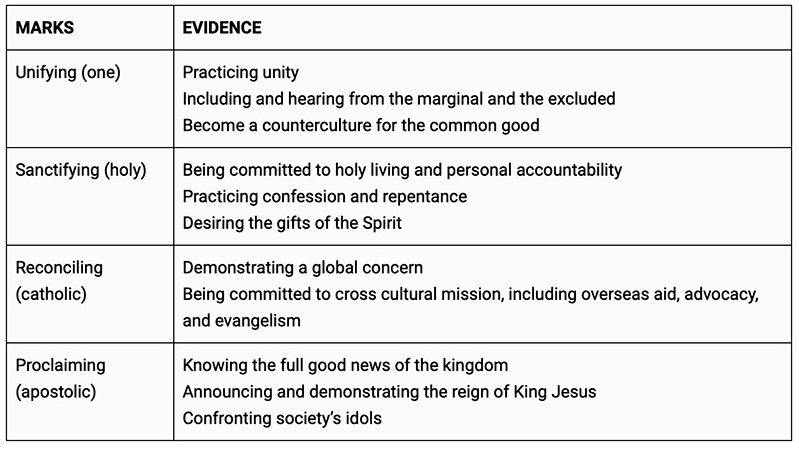
In the Nicene Creed, Christians declare our belief in the four key attributes of the church when we say, “[We believe] in one, holy, catholic, and apostolic church.” They are recited in the liturgies of the Catholic Church, the Eastern Orthodox Church, the Oriental Orthodox Churches, the Assyrian Church of the East, the Moravian Church, the Lutheran Churches, the Methodist Churches, the Presbyterian Churches, the Anglican Communion, and by members of the Reformed Churches.
In fact, we’ve been reciting those attributes, or “marks” as they came to be known, since they were adopted at the First Council of Constantinople in AD 381:
- The church is one. That is, a single, united body which has its basis in Christ Jesus.
- The church is holy, because it is the body of Christ with Jesus as the head.
- The church is catholic, an old term that means ‘universal.’ The church’s role is to spread the Word of God across the world.
- The church is apostolic. That is, our origins and beliefs are rooted in the ministry of the apostles.
You knew all that, right?
But aside from reciting it every so often, does it shape your understanding of your church’s life and ministry? I’d venture to suggest that in many churches it doesn’t shape things much at all. We have become over-familiar with this section of the creed and it no longer sparks us to action.
I think this contributes to the sluggishness many churches feel. Church can feel like riding a bike up a steep hill at times. We need a gear change.
From adjectives to adverbs
Part of the problem might be that the marks of the church are presented to us as static adjectives. We are invited to repeat a creed that states what the church is. But in his book "God’s Missionary People", missiologist Charles Van Engen suggests we should look at them as more dynamic adverbs. They are descriptors of what the church is becoming.
God grants us unity and then invites us to maintain our oneness with each other.
Similarly, Veli-Matti Kärkkäinen, a Finnish theologian who teaches systematic theology at Fuller Theological Seminary, says we should look at these four marks of the church not only as a set of goals to which we should aspire, but also as God’s gifts to his church. We are one, holy, catholic and apostolic because he has made us so. And we are called to devote ourselves to continue to be these things. God grants us unity and then invites us to maintain our oneness with each other.
Secondly, God makes us holy through the work of Christ and then invites us to remain such by repentance and obedience.
God’s grace is universal. The whole world is his, and yet he still asks us to take the gospel to the utter ends of the earth.
And fourthly, God has made us apostolic, sending us out to continue the work to which the apostles were committed, anchored in the truth first revealed to them.
These four terms describe what the church is and what is to become.
In this regard, Van Engen suggests they are adverbs, not adjectives. He thinks we need better, more colloquial terms, so he proposed the following:
- Unifying (one)
- Sanctifying (holy)
- Reconciling (catholic)
- Proclaiming (apostolic)
We should be a proclaiming, reconciling, sanctifying and unifying community.
And Van Engen goes even further and suggests we reverse the order, starting with apostolic proclamation. This, he suggests, will remind us of our missional posture and lay out the path along which we should be moving. In other words, we should be a proclaiming, reconciling, sanctifying and unifying community.
We are rooted in the revelation given to the apostles, commissioned to continue their tradition of proclaiming the good news of the Kingdom of Jesus, the church is called to a global concern for all the lost and broken people in the world. We can only achieve this by God’s grace as humble sinners, committed to repentance and confession and open to the continual filling of the Spirit. And in all things we strive for unity, inclusion, and radical hospitality.
When we live out our core identity as missionaries, the Lord matures us.
In his exploration of Van Engen’s work in his book, "No Silver Bullets", Daniel Im writes, “When we alter the Nicene marks of the church from adjectives to adverbs, we make the micro-shift from maturity to missionary. Instead of maturing our churches to be one, holy, catholic and apostolic, we are sending them out as everyday local and global missionaries to be a unifying, sanctifying, reconciling and proclaiming force in this world that desperately needs to hear the good news of Christ.”
This shouldn’t be read as Im’s disinterest in Christian maturity. It’s just that he sees maturity as a by-product of the church fulfilling its calling. He writes, “When we live out our core identity as missionaries, the Lord matures us.”
A better metric
Instead of measuring how many people attend our services, or how much money we have in our accounts, or what level of staffing we can sustain, what if we committed to measuring how much more proclamatory our people are; or how much more reconciling, or sanctifying, or unifying they are?
Rather than demonstrating my commitment to the people of God by just turning up, what if I was held accountable to these marks of the church? What would happen if I was answerable to others to the degree to which I was growing and deepening in those things?
Then, churches would be missional communities committed to equipping and supporting each other to be more unifying, more sanctifying, more reconciling and more proclaiming. We would require our members to show evidence of that deepening development. It might look like this:

I’m sure I’ve left something out of that list, but I hope you get the heart of it. When do we ever hold each other accountable for our understanding of the good news or our global concern or our willingness to confront idols?
If you used a set of metrices like these I think you would produce beautiful, welcoming, generous, godly, missional communities.
If your church feels like its straining to pedal uphill, this simple micro-shift could be a gear change for you. In saying that, I’m well aware that while shifting the marks of the church from adjectives to adverbs is a simple mind shift, it would involve a paradigm shift to implement it. But with the church’s fortunes continuing to wane in the West, what choice do we have?...
Really?
Originally published on Mike Frost's blog. Republished with permission.
Michael (Mike) Frost is an internationally recognized Australian missiologist and one of the leading voices in the missional church movement. His books are required reading in colleges and seminaries around the world and he is much sought after as an international conference speaker. Since 1999, Dr Frost has been the founding director of the Tinsley Institute, a mission study centre located at Morling College in Sydney, Australia. He has also been an adjunct lecturer at various seminaries in the United States. He is the author or editor of nineteen theological books, the best known of which include, The Shaping of Things to Come (2003), Exiles (2006), and most recently Mission Is The Shape of Water (2023). Frost’s work has been translated into German, Korean, Swedish, Portuguese and Spanish.





